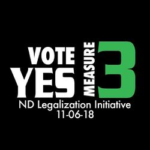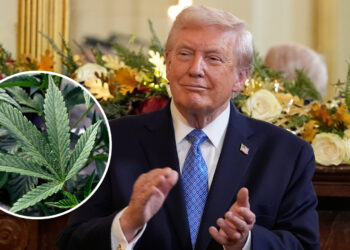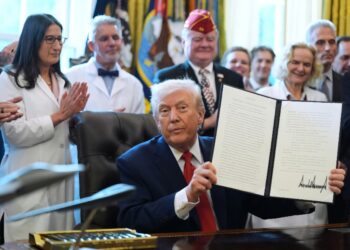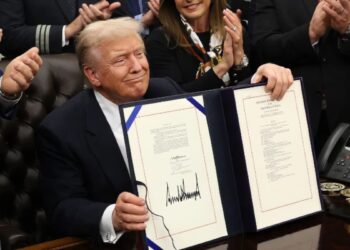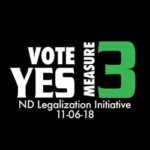 Measure3, Adult Use
Measure3, Adult Use
With Measure 3, it feels like the state’s legalization advocates decided to roll the dice on a tomato-plant initiative,* the kind of measure envisioned by the cannabis pioneer Jack Herer. Measure 3 would remove “hashish, marijuana, and tetrahydrocannabinols” from the state’s list of Schedule I substances, and prohibit prosecution of anyone over 21 for any non-violent cannabis related activity (including growing, processing, selling, or testing), except for the sale of cannabis to a person under 21. The measure would also require the automatic expungement of prior cannabis arrests and convictions.
What Measure 3 would not do is regulate cannabis in any way. There’s no mention of licensing. There are no limits on possession. North Dakotans could stack it like hay bales in the barn. North Dakotans could see that as a feature or a bug, hard to say.
 North Dakota residents could stack cannabis like bales of hay under the no-limit language in Measure 3. (kevinjeon00/iStock)
North Dakota residents could stack cannabis like bales of hay under the no-limit language in Measure 3. (kevinjeon00/iStock)
Who’s backing the measure: Legalize ND, the local advocacy group, is flying solo here. There’s no financial help or drafting language from Drug Policy Alliance or the Marijuana Policy Project. “We leave our bill wide open so the legislature can do their job — regulations, taxes, zoning, whatever,” Cole Haymond, an adviser to the Legalize ND campaign, told the Washington Post’s Christopher Ingraham. “This bill is by far the most progressive yet most conservative marijuana legalization bill that will be on any ballot across the country.”
Polls on the measure are…scattered. Leafly’s Tobias Coughlin-Bogue recently reported:
The money isn’t big in the race, but it’s lopsided. LegalizeND has raised about $32,500, according to late September campaign disclosures, while Healthy and Productive North Dakota, one of the organizations opposed to the measure, raised about $114,000.
Celebrity bonus: David Crosby has recorded and released a radio ad supporting Measure 3. You can hear it below.
See the full text of the measure here.
* A tomato-plant initiative is a measure that treats the cannabis plant like a tomato plant, free for all to grow, consume and distribute as any person sees fit, without any state or local regulation whatsoever.
Utah
 Proposition 2, Medical
Proposition 2, Medical
Utah’s Prop 2 would establish a state-controlled process that allows persons with qualifying medical conditions (cancer, HIV, epilepsy, chronic pain, ALS, Alzheimer’s, Crohn’s disease, MS, PTSD, autism) to acquire and use medical cannabis.
Leafly’s David Downs has an informative FAQ on what Prop 2 would and wouldn’t do, available here.
In certain limited circumstances, patients would be allowed to grow up to six cannabis plants for personal medical use. Prop. 2 would authorize the establishment of facilities that grow, process, test, or sell medical cannabis and require those facilities to be licensed by the state; and establish state controls on those licensed facilities, including: seed-to-sale inventory tracking, as well as limits on packaging, advertising, and the types of products allowed.
Medical marijuana enjoys widespread support throughout the state. It was polling at 75% earlier this year, but recently that support dropped to 64% following the Mormon church’s official statement opposing Prop 2.
Current Polling
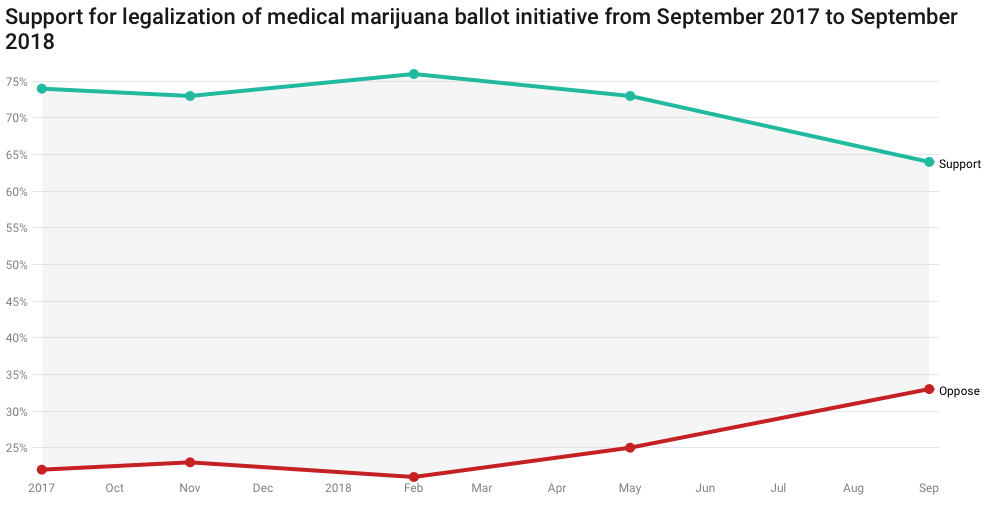 Click on chart to enlarge. (UtahPolicy.com)
Click on chart to enlarge. (UtahPolicy.com)
Who’s backing the proposition: The Utah Patients Coalition, led by director DJ Schanz, includes support from TRUCE (a Utah patients group), Libertas Institute (a Utah think tank), and the Marijuana Policy Project.
Who’s opposing it: The Utah Medical Association, Gov. Gary Herbert, and the leadership of the Church of Jesus Christ of Latter-day Saints, the single most powerful political entity in the state. The Drug Safe Utah Coalition, which is running an active “No on Prop 2” campaign, includes the Utah Sheriffs’ Association, DARE Utah, the Utah Eagle Forum, and others.
See the full text of the measure here.
Down Ballot: Contests Affecting Cannabis
California
Governor
At the top of the ticket, Lt. Gov. Gavin Newsom is seen as a shoo-in to replace Gov. Jerry Brown, which would increase cannabis’ support in the governor’s mansion. Gov. Brown has repeatedly denigrated cannabis users as lazy and unfocused. By contrast, former San Francisco Mayor Newsom embraced cannabis law reforms early, similar to his leadership on same-sex marriage.
US Senate
Polls suggest California Sen. Diane Feinstein (D) will skate into re-election in the mid-terms, fending off an insurgency on her progressive flank. After decades as a drug war hawk, Feinstein has been forced into evolving on supporting states’ rights to set cannabis policy. This September, the powerful Senate Judiciary Committee member also signed on as a co-sponsor of a cannabis descheduling bill.
US House
Also of note in California, incumbent Rep. Dana Rohrabacher (R – Huntington Beach)—cannabis’ most staunch ally in the House of Representatives—faces a formidable Republican challenger for his seat. After 2016’s election interference by Russia, Rep. Rohrabacher’s pro-Russia statements and positions have dogged him.
Municipal Cannabis Measures
At the local city and county level, California is awash in dozens if not more than 100 ballot initiatives to set local cannabis taxes and/or decide on allowing local dispensaries or farms. Voters also hold the power to approve of local stores and cannabis businesses through the election of hundreds of local city council members or county supervisors, many of whom are taking key positions on local store bans.
Florida
Governor
The race between Tallahassee Mayor Andrew Gillum (D) and Rep. Ron DeSantis (R) is a battle between an unabashed advocate of legalized regulation (Gillum) and an old-school prohibitionist (DeSantis). Whoever replaces outgoing Gov. Rick Scott will have a lot of say over the state’s emerging medical marijuana system, and over any possible adult-use legalization campaign. Leafly Deputy Editor Bruce Barcott wrote about the race here.
Ohio
Statewide
State Issue 1, an omnibus drug policy reform measure, would reduce many cannabis possession and paraphernalia felonies to misdemeanors.
City of Dayton
Dayton voters will consider an advisory measure to decriminalize small amounts of cannabis. If voters pass the measure, the city council would still have to vote to confirm it. The measure calls on the council to eliminate the current $150 fine for minor misdemeanor marijuana and hashish possession offenses.
Wisconsin
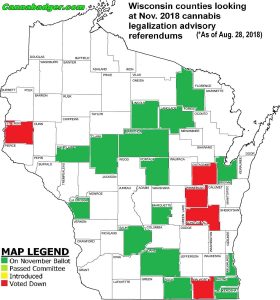 (Cannabadger.com)
(Cannabadger.com)
In an unusual campaign, cannabis activists in the Badger State have waged county-by-county combat to put legalization advisory measures on the ballot in November.
Because Wisconsin has no statewide initiative process, any full-state legalization measure would have to be approved by the state legislature.
These county ballots are expected to show legislators how popular cannabis reform is, and put added pressure on them to pass statewide medical or adult-use legalization in 2019.
Marijuana use referendum questions on Nov. 6 ballot in 16 Wisconsin counties, two cities https://t.co/IxtIGuySKR via @journalsentinel#WisconsinCannabisAdvisoryReferendums#SixteenCountiesHalfStatePopulationToVoteNov6
— Cannabadger.com (@cannabadger) August 31, 2018

